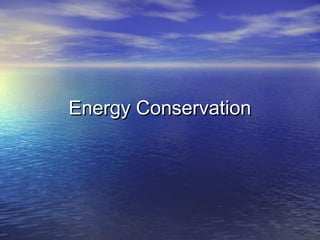
Energy conservation (1) sah
- 2. • ““We do not inherit theWe do not inherit the earth from ourearth from our parents, we borrow itparents, we borrow it from our children” –from our children” – Chief SeattleChief Seattle
- 3. • Energy use hasEnergy use has changed a great dealchanged a great deal since people reliedsince people relied solely on the sun,solely on the sun, their own strongtheir own strong bodies or beasts ofbodies or beasts of burden as energyburden as energy resources.resources.
- 4. • Long ago, peopleLong ago, people learned how to uselearned how to use water power to turnwater power to turn paddle wheels andpaddle wheels and wind power forwind power for transportation andtransportation and irrigation.irrigation.
- 5. • People learned to usePeople learned to use the chemical energythe chemical energy stored in materialsstored in materials like wood to cook andlike wood to cook and heat their homes.heat their homes.
- 6. • But machines andBut machines and technologies introducedtechnologies introduced during the Industrialduring the Industrial Revolution of the lateRevolution of the late 1818thth century requiredcentury required the use of other energythe use of other energy resources, especiallyresources, especially fossil fuels.fossil fuels.
- 7. • Fossil fuels like coal,Fossil fuels like coal, oil and natural gasoil and natural gas are considered to beare considered to be nonrenewable energynonrenewable energy resources.resources.
- 8. • Our fossil fuel reservesOur fossil fuel reserves formed over millions offormed over millions of years from decayingyears from decaying plants and animals.plants and animals. • As we use them up,As we use them up, they will not bethey will not be replenished in ourreplenished in our lifetimes.lifetimes.
- 9. • With the modern worldWith the modern world depending upon coal, oildepending upon coal, oil and gas for a majority ofand gas for a majority of its energy needs and theits energy needs and the prediction that the worldprediction that the world will nearly double its needwill nearly double its need for energy resources infor energy resources in several decades, it isseveral decades, it is important to conserveimportant to conserve energy and to investigateenergy and to investigate alternate energyalternate energy resourcesresources
- 10. • There are manyThere are many renewable energyrenewable energy sources that aresources that are alternatives to fossil fuels,alternatives to fossil fuels, but some are not withoutbut some are not without controversy.controversy. • For instance, nuclearFor instance, nuclear power is used to generatepower is used to generate about 25 percent of theabout 25 percent of the world’s electricity, but itworld’s electricity, but it has inherent risks,has inherent risks, especially in the disposalespecially in the disposal of radioactive waste.of radioactive waste.
- 11. • Hydroelectric plants use running water to generateHydroelectric plants use running water to generate electricity, however they may flood nearby lands and canelectricity, however they may flood nearby lands and can disrupt the normal flow of water, both of which negativelydisrupt the normal flow of water, both of which negatively affect the environment.affect the environment.
- 12. • Wind power isWind power is increasingly beingincreasingly being used as a cleanused as a clean source of renewablesource of renewable energy.energy. • Turbines harvest windTurbines harvest wind on wind farms andon wind farms and generate electricity.generate electricity.
- 13. • Solar power is a promising, renewable energySolar power is a promising, renewable energy resource than can be turned into electricity, andresource than can be turned into electricity, and it is used in many toys and even home heating.it is used in many toys and even home heating.
- 14. • Many other alternativeMany other alternative energy sources likeenergy sources like geothermal power, whichgeothermal power, which draws upon the earth’sdraws upon the earth’s natural heat, andnatural heat, and biomass, which producesbiomass, which produces an alternative to gasoline,an alternative to gasoline, are being considered inare being considered in the movement away fromthe movement away from fossil fuel dependence.fossil fuel dependence.
- 15. • In our everyday lives, we can also work to conserve energy.In our everyday lives, we can also work to conserve energy. – Insulating, turning off lights and only using appliances like dishwashersInsulating, turning off lights and only using appliances like dishwashers when they are full are just some of the ways people can limit energy usewhen they are full are just some of the ways people can limit energy use in their homes.in their homes. – Also, carpooling, bicycling, and taking public transportation are effectiveAlso, carpooling, bicycling, and taking public transportation are effective energy-saving ideas.energy-saving ideas.
- 16. • The earth’sThe earth’s inhabitants must takeinhabitants must take a serious look ata serious look at energy resources,energy resources, use and conservation.use and conservation.